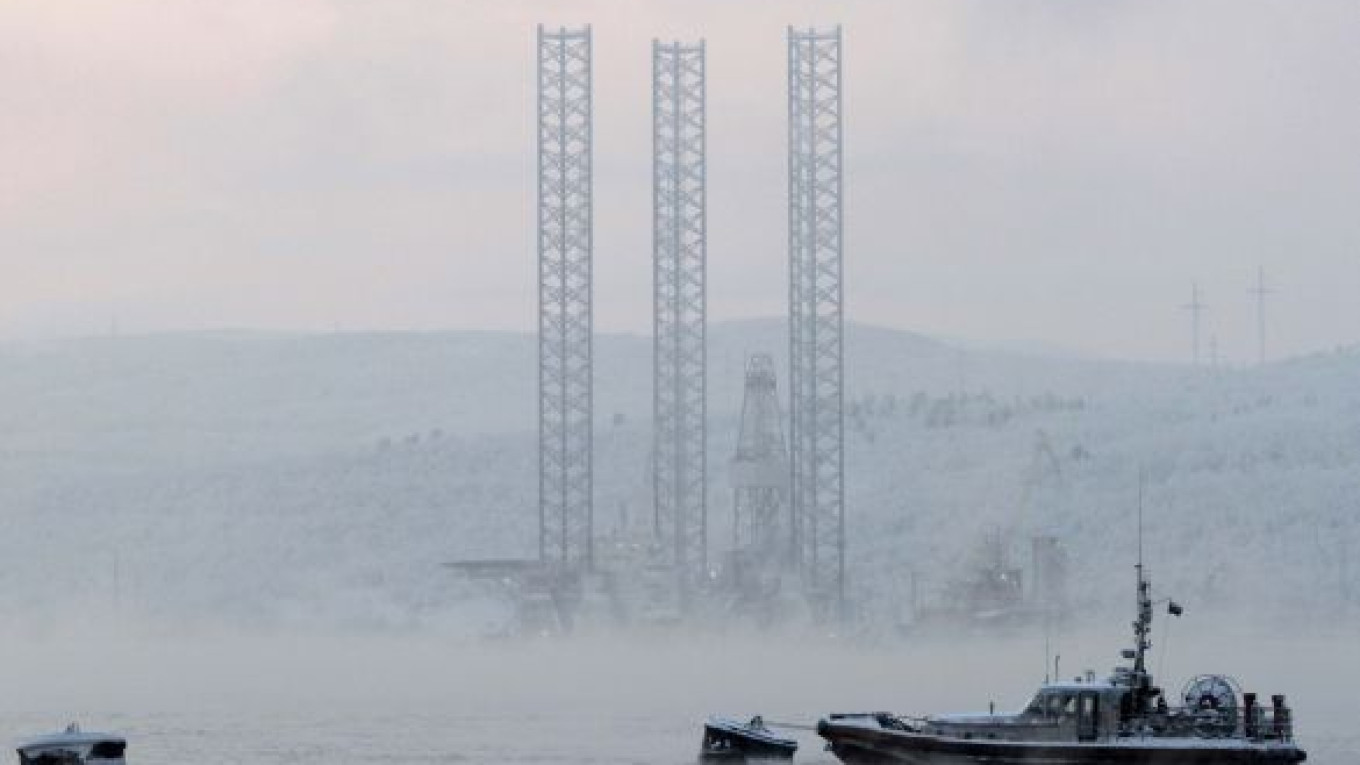At least four people died when the floating Kolskaya oil rig overturned and sank with 67 people on board in the stormy Sea of Okhotsk as it was being towed to shore, 200 kilometers off Sakhalin Island.
Fourteen people survived with minor injuries and 49 were reported missing late Sunday, the Transportation Ministry said. Four survivors were flown to the Nogliki Airport on Sakhalin Island.
The Kolskaya, owned by state-owned offshore drilling company Arktikmorneftegazrazvedka, was being transported to Sakhalin after testing the Pervoocherednaya deep-sea oil well.
The rig's captain sent an SOS signal early Sunday to evacuate people during a storm. But soon after, waves damaged the rig's pipes and knocked out cafeteria windows, inundating the rig with freezing water. It sank in 20 minutes at a depth of more than 1,000 meters, the Transportation Ministry said on its web site.
Several rescue vessels and two helicopters were dispatched to the site of the accident, but the bad weather, with waves up to 6 meters, high winds and snow flurries complicated the rescue operation. One of the several rescue vessels, Neftegaz 55, was damaged during the towing, slowing down the rescue effort.
Thirty-two workers on the rig were from Murmansk, while the rest were foreigners from unspecified countries, Komsomolskaya Pravda reported.
Four bodies clad in thermal suits were spotted floating in the sea. Rescuers could not retrieve them because of the ongoing storm.
The rescue operation was halted about 7:30 p.m. Sakhalin time and was expected to resume Monday morning when it got light.
The Transportation Ministry opened an investigation.
The drilling rig was built in 1985 by Finnish company Rauma-Repola and is now owned by Arktikmorneftegazrazvedka, a subsidiary of state-controlled Zarubezhneft, RIA-Novosti said. Its home port is Murmansk in northwestern Russia.
In April, Gazprom subsidiary Gazneft commissioned the Kolskaya to perform drilling works on the shelf in the far eastern Sea of Okhotsk. The platform arrived in Magadan in August and started operations the following month. It was returning to the base after completing the assignment, Gazprom said Sunday.
The average lifetime of a floating oil rig is usually about 18 years, meaning the Kolskaya should have been put out of service about six years ago, Greenpeace Arctic project coordinator Roman Dolgov said.
The accident, he said, raises questions about the competence of the people involved in the operation, especially since rigs are not supposed to be moved during a storm. Oil rigs are less steady than ships and can overturn easily, Dolgov said.
"Energy organizations are taking colossal risks for economic gains," said Alexei Knizhnikov, an oil and gas expert at the World Wildlife Fund.
The environmental damage from Sunday's sinking is minimal because the rig was not carrying a large amount of oil.
The Prirazlomnaya, declared the first-ever ice-resistant oil rig, is supposed to start work early next year in the Arctic Pechora Sea. The rig is equipped with parts from the Hutton oil platform, built in 1984 and retired from the North Sea in 2002.
The weekend accident is an alarming development, foreshadowing more accidents in the Arctic, Dolgov said. In the Arctic, the environment is much harsher, with storms that last months, huge ice masses and much longer distances for rescues.
"It's scary to think about what will happen in the Arctic," Dolgov said.
The accident is not likely to stop offshore oil exploration in the Arctic or elsewhere, both Dolgov and Knizhnikov said.
Standards in oil exploration technologies will get stricter as a result of the accident, said Yevgeny Fyodorov, head of the State Duma's entrepreneurial and economic policy committee. More money will be spent on insurance and safety controls.
"Safety standards are the trial-and-error experiment of humankind," Fyodorov said by phone. "They are only worked out with the course of events."
A Message from The Moscow Times:
Dear readers,
We are facing unprecedented challenges. Russia's Prosecutor General's Office has designated The Moscow Times as an "undesirable" organization, criminalizing our work and putting our staff at risk of prosecution. This follows our earlier unjust labeling as a "foreign agent."
These actions are direct attempts to silence independent journalism in Russia. The authorities claim our work "discredits the decisions of the Russian leadership." We see things differently: we strive to provide accurate, unbiased reporting on Russia.
We, the journalists of The Moscow Times, refuse to be silenced. But to continue our work, we need your help.
Your support, no matter how small, makes a world of difference. If you can, please support us monthly starting from just $2. It's quick to set up, and every contribution makes a significant impact.
By supporting The Moscow Times, you're defending open, independent journalism in the face of repression. Thank you for standing with us.
Remind me later.


